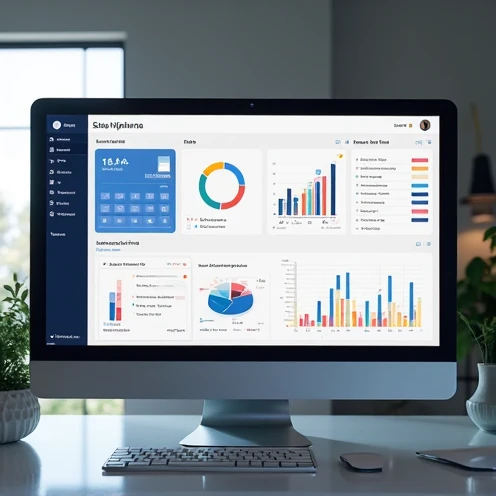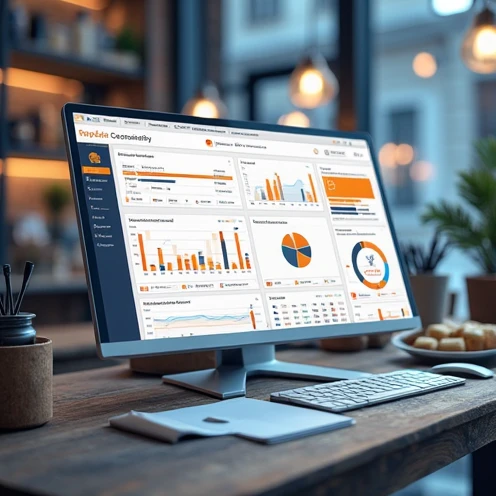Manufacturing CRM for Streamlined Production and Smarter Customer Relationships
In today’s fast-paced industrial landscape, manufacturers face pressure to deliver faster, better, and cheaper—without compromising quality. This is where Manufacturing CRM (Customer Relationship Management) becomes a game-changer. Far more than a contact management tool, it aligns production, sales, and support teams with one powerful, integrated system.
Iklan Google AdSense
By leveraging real-time data, CRMs tailored for manufacturers help reduce errors, forecast demand, and provide personalized customer experiences. As industries move toward smart factories and automation, adopting a Manufacturing CRM is no longer a luxury—it’s a necessity.
Understanding the Role of Manufacturing CRM
A general CRM manages customer interactions. However, a Manufacturing CRM is engineered to handle the complexities of B2B relationships, inventory workflows, job tracking, and production planning.
Iklan Google AdSense
With the ability to sync seamlessly with ERP and MES systems, it acts as a central hub—offering everyone from engineers to sales reps instant access to the same real-time information. This reduces delays, miscommunications, and costly rework.
In short, a Manufacturing CRM closes the gap between factory operations and customer engagement.
Why Manufacturing CRM Must Evolve Beyond Spreadsheets
Spreadsheets are static, error-prone, and difficult to scale across departments. In contrast, CRM systems allow for automation, data consistency, and real-time updates.
Imagine a scenario where your sales team confirms a delivery date based on outdated stock data. That simple mistake can erode client trust. A Manufacturing CRM eliminates such risks by syncing production capacity with sales promises.
Moreover, collaboration improves drastically. Teams from different departments can view order statuses, customer history, and current workloads—without sending endless emails or holding unnecessary meetings.
Features That Make Manufacturing CRM Unique
Unlike standard CRMs, manufacturing-specific tools come packed with features suited for complex production environments.
Important features include:
- Inventory monitoring for both raw materials and finished goods
- Order tracking with estimated delivery timelines
- Quotation and invoice automation
- After-sales support ticketing
- Customer self-service portals
These features not only enhance productivity but also provide a consistent customer experience throughout the product lifecycle.
Enhancing B2B Sales in Manufacturing
In manufacturing, sales processes are often lengthy and involve multiple stakeholders. A Manufacturing CRM system simplifies lead tracking, quote approvals, and contract renewals.
Sales teams can automate follow-ups, schedule consultations, and track all interactions in one place. By having access to customer purchase history and preferences, they can offer tailored solutions—improving conversion rates and building stronger relationships.
It also ensures continuity. When a sales rep is unavailable, another team member can easily pick up the thread without missing a beat.
Forecasting Made Accurate with Real-Time Data
Manufacturers often struggle with demand forecasting. Overestimating leads to excess stock, while underestimating results in delayed deliveries. A Manufacturing CRM analyzes customer trends, sales velocity, and seasonal shifts to offer reliable forecasts.
Such insights empower production teams to plan better, finance teams to manage budgets wisely, and inventory teams to minimize holding costs. In short, forecasting becomes a strategic advantage rather than a guessing game.
After-Sales Support That Builds Customer Loyalty
Once a product is shipped, the relationship doesn’t end—it transforms. A good Manufacturing CRM includes tools for post-sale engagement such as service reminders, warranty management, and issue tracking.
When a client has an issue, your support team can access their full order history, allowing for faster and more relevant help. Moreover, automated feedback collection and maintenance alerts ensure clients feel valued, not forgotten.
This leads to repeat orders and increased word-of-mouth referrals—both crucial for long-term growth.
Collaboration Across Departments Becomes Effortless
A recurring problem in manufacturing is departmental silos. The production team doesn’t always know what sales promised. Customer service may not be aware of current lead times. A Manufacturing CRM bridges these gaps.
With shared dashboards, KPIs, and customer records, everyone is aligned. Updates happen in real time, so there’s no confusion about responsibilities or progress. This improved visibility leads to fewer errors, faster fulfillment, and happier clients.
Integration with ERP, MES, and IoT Tools
Modern manufacturers use multiple platforms—ERP for finance, MES for shop floor control, and IoT devices for machine performance. The best Manufacturing CRMs integrate smoothly with all of them.
This creates a unified data ecosystem. When a sensor detects a potential machine failure, it can alert the CRM, which triggers a support ticket. Similarly, ERP integration allows financial data to influence customer interactions and decision-making.
These integrations unlock efficiencies and support predictive maintenance, resource planning, and automated workflows.
Selecting the Right CRM for Your Factory
Not all CRMs fit manufacturing needs. Some are built for retail or service industries and lack crucial tools like job order tracking or BOM (Bill of Materials) support.
When choosing your Manufacturing CRM, look for:
- Scalability across multiple factories or regions
- Customization for your product lines and processes
- Integration with your current software ecosystem
- User-friendly dashboards and training resources
Always involve end-users from multiple departments in the decision-making process to ensure buy-in and long-term usage.
Why Now is the Time to Act
The manufacturing world is becoming smarter, more connected, and more customer-focused. A Manufacturing CRM enables you to stay competitive, agile, and prepared for disruption.
Whether you produce automotive parts, industrial equipment, or consumer goods, your ability to manage relationships and processes efficiently will define your success. CRM is more than software—it’s a strategy.
Make the move now. Train your staff, align your teams, and prepare for the productivity boost your factory deserves.
Iklan Bersponsor Google






